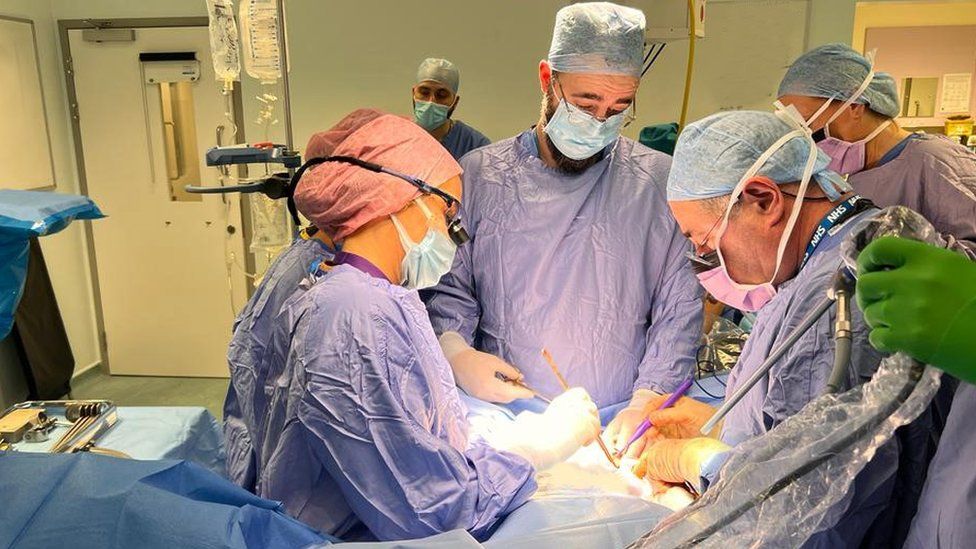Surgeons in Oxford have carried out the first womb transplant in the UK.
The recipient was a 34-year-old woman, and the donor her 40-year-old sister, both of whom wish to remain anonymous.
Doctors say both recovered well from surgery and the younger sister – with her husband – has several embryos in storage, waiting to be transferred.
A team of around 20 carried out the procedures, lasting around 17 hours, in adjoining operating theatres at the Churchill hospital in February.

Her sister already had two children and had completed her family. Both sisters live in England.
Prof Richard Smith, gynaecological surgeon, who led the organ retrieval team, has spent 25 years researching womb transplantation. He told the BBC it was a “massive success”.
He said: “The whole thing was emotional. I think we were all a bit tearful afterwards.”
Transplant surgeon Isabel Quiroga, who led the team implanting the womb, said the recipient was delighted: “She was absolutely over the moon, very happy, and is hoping that she can go on to have not one but two babies. Her womb is functioning perfectly and we are monitoring her progress very closely.”
The woman had her first period two weeks after the surgery. Like other transplant patients, she needs to take immunosuppressive drugs to prevent tissue rejection. These carry some long-term health risks, so the uterus will be removed after a maximum of two pregnancies.
She was born with a rare condition, Type 1 Mayer-Rokitansky-Küster-Hauser (MRKH) where the uterus is absent or underdeveloped, but has functioning ovaries. Prior to surgery she had fertility treatment with her husband, and they have eight embryos in storage.
Both underwent counselling before surgery, and their case was reviewed and approved by the Human Tissue Authority. The NHS costs, estimated at £25,000, were paid for by the charity Womb Transplant UK. More than 30 staff involved on the day gave their time for free.
Prof Smith, who is Chairman of Womb Transplant UK, said the team had been authorised to carry out a total of 15 transplants – five with live donors and 10 with deceased, brain-dead donors – but would need another £300,000 to pay for all the procedures.
He said: “The shocking truth is that there are currently more than 15,000 women of child-bearing age in this country who have Absolute Uterine Factor Infertility. They were either born without a womb or have had a hysterectomy due to cancer or other abnormalities of the womb.”
In 2014 a woman in Sweden became the first to have a baby as a result of a womb transplant. She had received a donated womb from a friend in her 60s.
Since then 100 womb transplants have taken place worldwide and around 50 babies have been born, mostly in the US and Sweden, but also in Turkey, India, Brazil, China, Czech Republic, Germany and France.
Surgeons in the UK were given permission to begin performing womb transplants in 2015. Writing in the British Journal of Obstetrics and Gynaecology, the team cited “institutional delays” and Covid as reasons why the UK had taken so long to perform its first operation.
Womb Transplant UK said more than 500 women had contacted the charity wishing to take part in the programme, and around a dozen had embryos in storage or were undergoing fertility treatment – a prerequisite for getting on the waiting list.
One of them is 31-year-old Lydia Brain, who needed a hysterectomy after having womb cancer. She was diagnosed when she was 24 after experiencing heavy periods, and bleeding between periods, which led to anaemia. She and her partner have paid £15,000 for fertility treatment and now have several embryos in storage.

Lydia said she was delighted by the news of the first successful womb transplant in the UK, describing it as “miraculous”.
She told the BBC: “Infertility was a huge part of the impact of my cancer. It affects you every day as you can’t avoid pregnant people, babies, and your friends getting into that phase of their life.”
She said it “would mean everything” if she could get on the waiting list and have a womb transplant, because she wants to “carry my own child and have that experience, being able to breastfeed and to have a newborn baby, at least once.”
Lydia said she would consider surrogacy and adoption, but said both routes were problematic. “The laws and the process are very difficult,” she explained, adding that with adoption “you often don’t get a newborn baby”.
Lydia now works for the charity Eve Appeal, which funds research and raises awareness into the five gynaecological cancers – womb, ovarian, cervical, vulval and vaginal.
Related Topics
- Women’s health
- Transplants
- Health
- Women
- Oxford
- Uplifting stories
Related Internet Links
-
Churchill Hospital Oxford
-
The Eve Appeal
